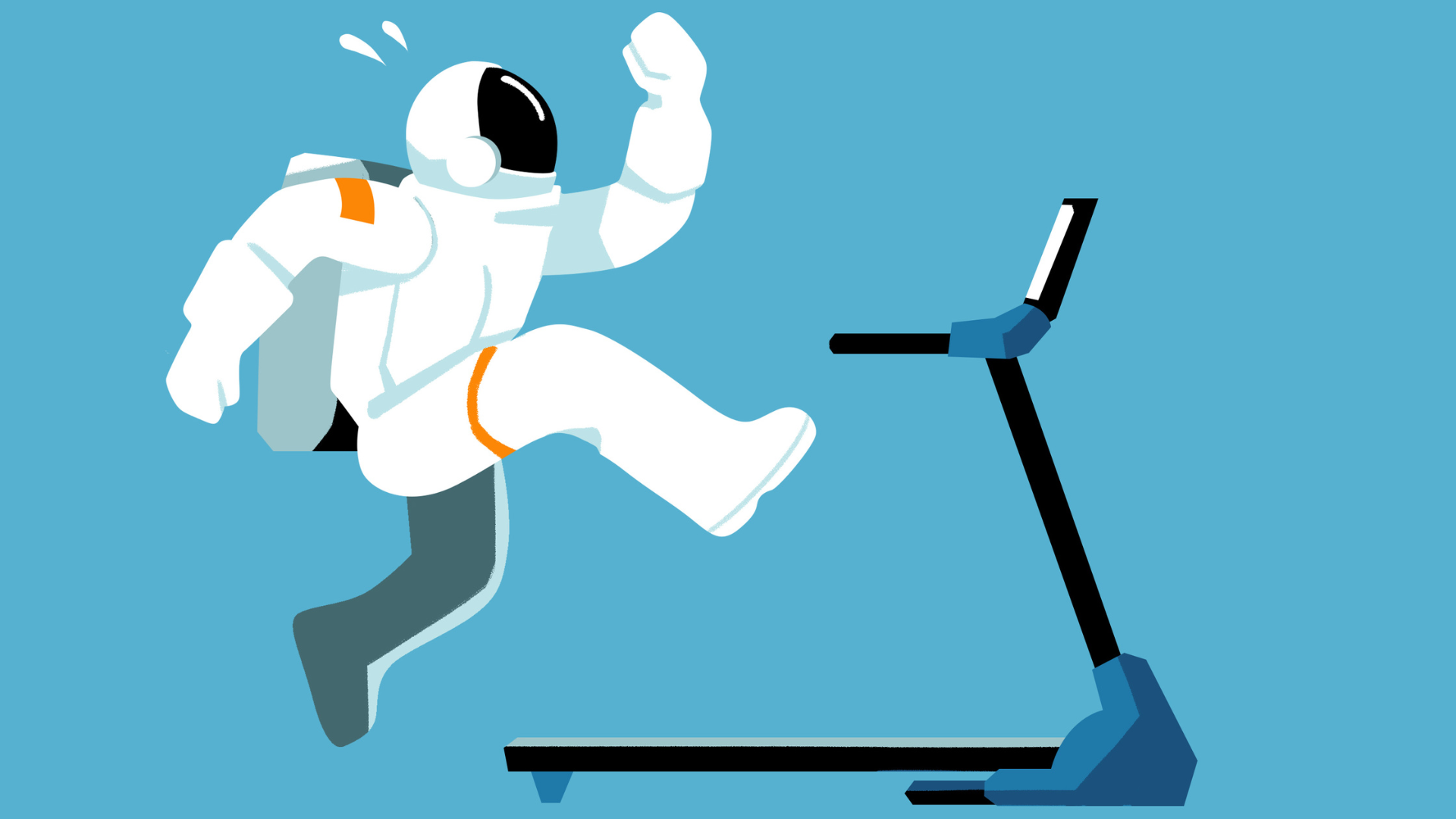Fitness
Train Like An Astronaut

On Earth, we’re constantly working against gravity. When we stand, walk, or lift things, our muscles and bones are battling Earth’s gravitational pull. This natural resistance keeps our bodies strong. But in space, it’s a whole different story!
On a space station, astronauts experience microgravity. They can float around and use their muscles with little effort. That may sound fun (and it is), but it can also harm an astronaut’s health. Without the stress of gravity, the body doesn’t maintain or build muscle and bone. So muscle weakens, and bones lose density. To counteract the effects of microgravity on the body, astronauts on the International Space Station exercise between two and two-and-a-half hours a day, six days a week. As they say, use it or lose it!
The heart may also weaken in space because it doesn’t have to counteract gravity to pump blood throughout the body. As a result, astronauts can experience changes similar to those caused by aging or illness. Meanwhile, blood and body fluids are pushed from the legs and abdomen to the heart and head, which causes swelling, leading to hearing loss, eye injury, and pressure on the brain.
Exercise helps astronauts—and you—improve mental health as well. Physical activity reduces depression, anxiety, and stress. It also helps people sleep better, which positively affects mental health and regulates circadian rhythms, your body’s clock that controls when you feel alert or tired. Plus, exercise has been shown to improve memory and cognition.
So exercise in space isn’t just about staying fit. Astronauts need to maintain their mental health, heart health, muscle strength, and bone density. But here’s the exciting part: The research done on the ISS isn’t just helping astronauts. It helps people on Earth too!


Fitness
Rohman Shawl spills his diet and workout secrets for those washboard abs; reveals ‘instant’ trick for burning fat

Rohman Shawl is nothing if not dedicated to staying fit and healthy. The model-turned-actor, who was recently seen in the Tamil film Amaran alongside Sivakarthikeyan and Sai Pallavi, believes in eating clean, training hard, and training smart. His workout routine is proof that hard work and effort pay off – have you seen those perfect abs and big set of biceps? Also read | Srishti Dixit reveals her diet and fitness secrets, what triggered her weight loss journey: ‘I eat everything but…’
When it comes to health and wellness, we should all take a page out of Rohman’s book – his approach isn’t about losing weight or building a ripped physique; it’s about feeling healthier. Don’t miss his tips and tricks for motivating yourself the next time you feel like swapping gym time for couch time.
In an exclusive interview with HT Lifestyle, Rohman shares his fitness mantra, workout routine and diet secrets. Excerpts:
Do you work out in the morning or evening; and why?
I am usually an evening person, as it helps me get better sleep at night. But I have a ritual of waking up in the morning, stretching my body, and doing 60 push-ups (3 sets of 20 reps each) on a daily basis. It helps me start my day on a high note, and I feel a sense of accomplishment.
If not working out in a gym due to travel or work commitments, how do you stay active?
I haven’t been to a gym in a long time. For my film Amaran, I had to follow a particular body type of being lean and not so shredded, so I changed my exercise routine!! I am into callisthenics and yoga now, which can be done anywhere. Also, if there is no space, I go for a run!! Another important thing that I have included in my routine is to play football with friends once a week. It has helped me be healthy both physically and mentally. I will return to the gym if my next project demands it, but otherwise, I am quite happy following the current routine.
How do you stay motivated to exercise when you don’t feel like it?
For me, exercise is a way of being healthy rather than looking fit. You can have all the Money, name, and fame in the world, but if you aren’t healthy, you won’t be able to enjoy all of that. There can’t be a better motivation than that!
What’s your trick to burning more calories and fat?
For me, that would be a run of 7-8 km, which includes 3 sets of 200-meter sprints at different intervals (I have always been a sprinter; I can still cover 100 mts in around 11 seconds). It gives me instant results.
Do you push yourself too hard for your workouts sometimes?
I used to, not anymore. With age and experience, you realise that your body needs rest, so you go easy on it !! The more recovery time, the better the results. Having said that, that’s what works for me, as I have a certain body type. This might not work for everyone.
How do you manage to stick to your exercise regime and diet plan?
Realising the mere fact that to reap the most of this precious life that you have been given, the least you can do is to feed your body, mind and soul in the best possible way! Once you love yourself, it’s not hard to manage it.
Are you on a particular diet? No sugar, intermittent fasting or any other?
I am not someone who counts calories, but I do follow a 2-meal-a-day plan. I only have brunch and then dinner. Since I have started doing it, I feel my body has become more active, and I feel fitter than ever. Also, I try to avoid sugar as much as possible, but I do have a sweet tooth, so sometimes I do indulge.
Any diet tips and tricks of yours that fans can learn from?
First of all, it’s very important to be aware of what your body is trying to tell you, because it does speak to you by giving signs. What might work for me may not work for you, so don’t just follow someone blindly. Get regular tests done and know your body type before you go on a diet. Trust me, it’s not so hard; you just need to believe in yourself!
What are the staples of your diet? What’s the first thing you eat/drink when you wake up and the last thing before you sleep?
I have a very basic diet, I wake up and drink at least 2 glasses of water, and then I wait for 40 minutes before I make my own breakfast (it’s a ritual, I have to make my own breakfast), which includes 4 pieces of avocado toast, 2 sunny-side-up eggs and some coffee that keeps me going throughout the day. Then, for dinner, I usually have rice and dal with some curd and tandoori chicken. That’s the last thing that I eat unless I am in the mood to indulge, then I do have some dessert. Just a reminder: Since I am only maintaining my current body shape, I am following this. To make any changes, I will have to change my diet for sure.
What is your daily workout like, and how many days a week do you work out?
I wake up, stretch and do 60 push-ups (20×3 reps). Then, the evening would be callisthenics and yoga (usually 3-4 times a week). Every Wednesday evening is booked for football for 90 minutes, which I feel has helped me immensely, both physically and mentally. I would like to request you all to please find a sport of your choice and play it at least once a week, no matter what. It will help your fitness journey on another level. Then, once a week, usually on Sundays, I go for my run, which is usually 7-8 km and involves pace walking and sprints.
Disclaimer: This article is for informational purposes only and not a substitute for professional medical advice. Always seek the advice of your doctor with any questions about a medical condition.
Fitness
Man who lost 50 kg reveals ‘best exercise routine for permanent weight loss’

Dec 21, 2024 07:51 AM IST
Losing weight doesn’t have to be complicated, but with so much information available, it can be confusing. Here’s something that could aid your weight loss.
Fitness
Does exercise sharpen your memory? How long do the benefits last? New research

Most of us have forgotten where we put our phones or car keys or what we ate for dinner last night. We’ve walked into a room and wondered why we even walked in there in the first place. A sharper memory helps us retain the information we’ve learned and remember what’s important. We’re always hearing about this superfood or this special drink or supplement that can boost memory, and we wonder if there’s any merit to many of these claims.
With all the benefits of exercise, from lowering blood pressure to perking up your mood, researchers wanted to explore if exercise could boost memory and how long these benefits last. If working out is effective, how many hours or days do those short-term cognitive benefits last? Does working out the day before improve your memory the following day? Let’s look at the new research.
The study
In a small study published in the International Journal of Behavioral Nutrition and Physical Activity, researchers analyzed data from 76 adults. Participants were aged 50 to 83. Over eight days, participants took daily cognitive tests and wore activity trackers.
The results

Researchers revealed that participants who engaged in more moderate to vigorous physical activity performed better in memory tests the following day. The adults who had better scores on the memory tests:
Moderate activity can include brisk walking, cycling, or jogging. Participants who spent more time being sedentary performed worse on the tests.
Previous research

This isn’t the first study to associate exercise with a better memory, and it certainly won’t be the last. Research has shown that moving your muscles enhances your neuronal activity, which refers to the chemical and electrical signals generated and transmitted by neurons in your brain. Previous studies found that people had better results on memory tests in the hours following exercise, but researchers weren’t sure how long these positive effects stick around.
Interestingly, researchers in one study determined that high-intensity interval training or HIIT and cycling were the types of exercise most likely to enhance memory, executive function, attention, and information processing.
Why does exercise improve recollection and cognition?

Researchers and experts believe exercise can improve memory and cognition by increasing blood flow and stimulation of neurotransmitters. Neurotransmitters help transmit messages between nerve cells to assist memory and thinking. Exercise can also prompt the hippocampus to form new neurons. The hippocampus in your brain plays a big role in your learning and recollection.
Neuroplasticity of the brain

Research highlights that exercise promotes neuroplasticity in the brain. Neuroplasticity refers to your brain’s ability to adapt and form synaptic connections, particularly in response to learning, experience, or after an injury.
The takeaway

Spending less time sitting and getting a minimum of 6 hours of sleep every night is beneficial for your mental faculties and overall health. If you get a good workout in the day before, your mind and memory could be sharper the following day. It turns out that working out really could enhance your memory, at least for the next 24 hours, which is worth keeping in mind if you have a big presentation or test coming up. The research is mounting.
-

 Politics1 week ago
Politics1 week agoCanadian premier threatens to cut off energy imports to US if Trump imposes tariff on country
-
/cdn.vox-cdn.com/uploads/chorus_asset/file/25782636/247422_ChatGPT_anniversary_CVirginia.jpg)
/cdn.vox-cdn.com/uploads/chorus_asset/file/25782636/247422_ChatGPT_anniversary_CVirginia.jpg) Technology1 week ago
Technology1 week agoInside the launch — and future — of ChatGPT
-
/cdn.vox-cdn.com/uploads/chorus_asset/file/25789444/1258459915.jpg)
/cdn.vox-cdn.com/uploads/chorus_asset/file/25789444/1258459915.jpg) Technology1 week ago
Technology1 week agoOpenAI cofounder Ilya Sutskever says the way AI is built is about to change
-

 Politics1 week ago
Politics1 week agoU.S. Supreme Court will decide if oil industry may sue to block California's zero-emissions goal
-
/cdn.vox-cdn.com/uploads/chorus_asset/file/25546252/STK169_Mark_Zuckerburg_CVIRGINIA_D.jpg)
/cdn.vox-cdn.com/uploads/chorus_asset/file/25546252/STK169_Mark_Zuckerburg_CVIRGINIA_D.jpg) Technology1 week ago
Technology1 week agoMeta asks the US government to block OpenAI’s switch to a for-profit
-

 Politics1 week ago
Politics1 week agoConservative group debuts major ad buy in key senators' states as 'soft appeal' for Hegseth, Gabbard, Patel
-

 Business6 days ago
Business6 days agoFreddie Freeman's World Series walk-off grand slam baseball sells at auction for $1.56 million
-
/cdn.vox-cdn.com/uploads/chorus_asset/file/23951353/STK043_VRG_Illo_N_Barclay_3_Meta.jpg)
/cdn.vox-cdn.com/uploads/chorus_asset/file/23951353/STK043_VRG_Illo_N_Barclay_3_Meta.jpg) Technology6 days ago
Technology6 days agoMeta’s Instagram boss: who posted something matters more in the AI age













